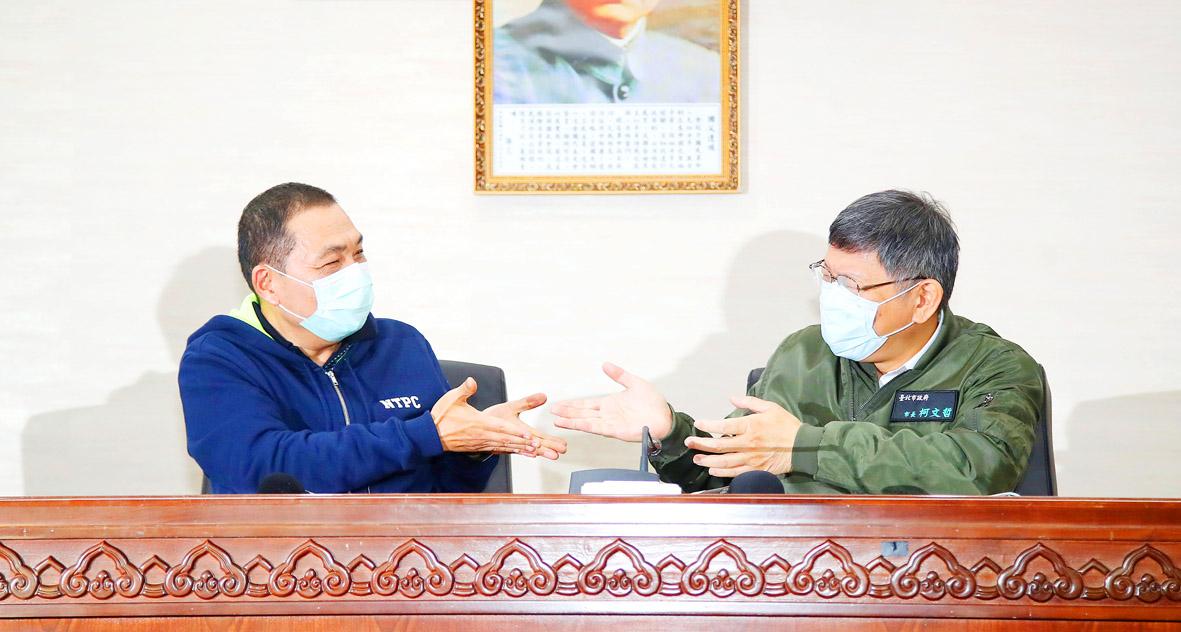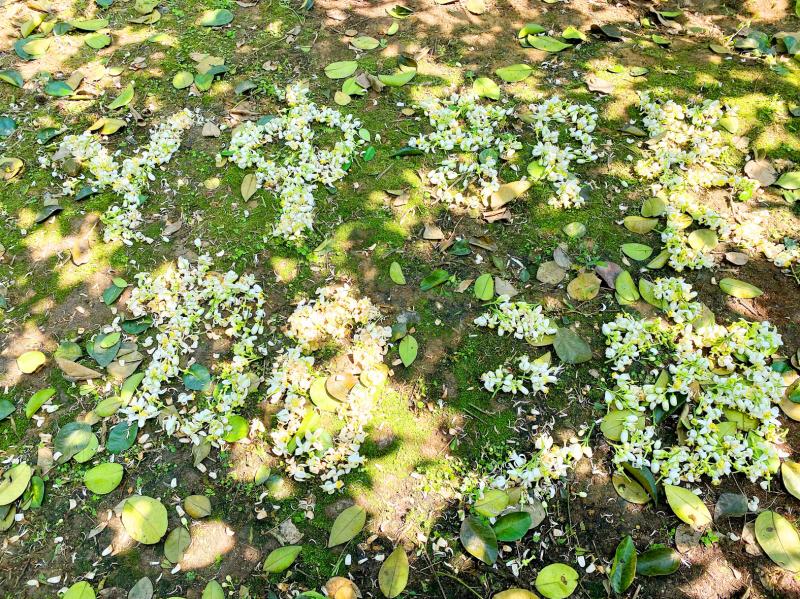Taipei Mayor Ko Wen-je (柯文哲) and New Taipei City Mayor Hou You-yi (侯友宜) yesterday pledged at an annual meeting of the cities’ leaders to provide mutual medical services and further collaboration on COVID-19 prevention, denying that their prevention strategies are inconsistent, despite media reports.
Disease prevention should be predicated on the “best preparations for worst-case scenarios,” and the New Taipei City Government has followed the All-out Defense Mobilization Readiness Act (全民防衛動員準備法) in taking precautions allowing it to act decisively if a city lockdown is ordered by the central government, Hou, a former police officer, said on Wednesday.
Ko, a physician and the chairman of the Taiwan People’s Party, said that the Taipei City Government has also taken precautionary measures, but that such measures should not get “too far” ahead of the present coronavirus situation.

Photo: CNA
Their remarks triggered speculation that the two cities might be diverging on disease-prevention policy.
At yesterday’s meeting, the two mayors constantly applauded each other, vowing to work together to stop the virus’ spread.
The cities are considering a trial of mask dispenser machines and would not let each other’s borders stop them from providing medical treatment, Ko said, adding that the two plan to set up shared locations for isolating COVID-19 patients.

Photo: Yu Chao-fu, Taipei Times
“The two cities are a body of life and there is no problem with inconsistency,” Hou said, adding that he is working closely with Ko on prevention strategies.
A hotline has been set up so that the mayors can handle any emergency, Hou said.
Taipei City Deputy Mayor Vivian Huang (黃珊珊) said that each city notifies the other about any coronavirus-related information so that officials stay informed.
Asked about his party’s suggestion that Premier Su Tseng-chang (蘇貞昌) take over from Minister of Health and Welfare Chen Shih-chung (陳時中) as head of the Central Epidemic Command Center, Ko said the move was not necessary.
Su and Chen should communicate and arrive at a consensus regarding policies, Ko added.
Local media and commentators often compare Chen and Ko, both medical professionals.
While Chen is gaining popularity for his professionalism and pragmatism as the center’s head, Ko has drawn criticism for frequent slips of the tongue. The two have butted heads over the best way to evacuate Taiwanese citizens after the lockdown in Wuhan, China, is lifted.
Ko said that the government should focus on the work at hand and not waste time on a meaningless war of words.
Hou said that New Taipei City would follow the central government’s guidance on disease prevention, adding that the two city leaders are shoulder-to-shoulder on that issue.
Separately, Huang said that the Taipei City Government is considering a special scheme that would hire volunteers to help with home quarantines.
“Local borough wardens and district offices are swamped,” Huang said, adding that she would discuss the project with the Taipei Civil Affairs Bureau while waiting for guidance from the central government.

‘DENIAL DEFENSE’: The US would increase its military presence with uncrewed ships, and submarines, while boosting defense in the Indo-Pacific, a Pete Hegseth memo said The US is reorienting its military strategy to focus primarily on deterring a potential Chinese invasion of Taiwan, a memo signed by US Secretary of Defense Pete Hegseth showed. The memo also called on Taiwan to increase its defense spending. The document, known as the “Interim National Defense Strategic Guidance,” was distributed this month and detailed the national defense plans of US President Donald Trump’s administration, an article in the Washington Post said on Saturday. It outlines how the US can prepare for a potential war with China and defend itself from threats in the “near abroad,” including Greenland and the Panama

The High Prosecutors’ Office yesterday withdrew an appeal against the acquittal of a former bank manager 22 years after his death, marking Taiwan’s first instance of prosecutors rendering posthumous justice to a wrongfully convicted defendant. Chu Ching-en (諸慶恩) — formerly a manager at the Taipei branch of BNP Paribas — was in 1999 accused by Weng Mao-chung (翁茂鍾), then-president of Chia Her Industrial Co, of forging a request for a fixed deposit of US$10 million by I-Hwa Industrial Co, a subsidiary of Chia Her, which was used as collateral. Chu was ruled not guilty in the first trial, but was found guilty

A wild live dugong was found in Taiwan for the first time in 88 years, after it was accidentally caught by a fisher’s net on Tuesday in Yilan County’s Fenniaolin (粉鳥林). This is the first sighting of the species in Taiwan since 1937, having already been considered “extinct” in the country and considered as “vulnerable” by the International Union for Conservation of Nature. A fisher surnamed Chen (陳) went to Fenniaolin to collect the fish in his netting, but instead caught a 3m long, 500kg dugong. The fisher released the animal back into the wild, not realizing it was an endangered species at

DEADLOCK: As the commission is unable to forum a quorum to review license renewal applications, the channel operators are not at fault and can air past their license date The National Communications Commission (NCC) yesterday said that the Public Television Service (PTS) and 36 other television and radio broadcasters could continue airing, despite the commission’s inability to meet a quorum to review their license renewal applications. The licenses of PTS and the other channels are set to expire between this month and June. The National Communications Commission Organization Act (國家通訊傳播委員會組織法) stipulates that the commission must meet the mandated quorum of four to hold a valid meeting. The seven-member commission currently has only three commissioners. “We have informed the channel operators of the progress we have made in reviewing their license renewal applications, and